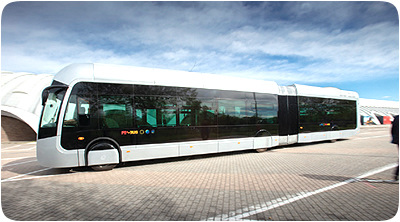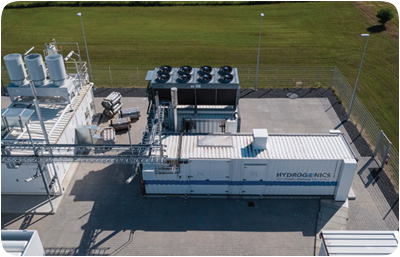 The Fuel Cells and Hydrogen Joint Undertaking (FCH JU) has achieved a lot in the eleven years since its inception, as it strives to make hydrogen and fuel cell products an everyday reality in Europe.
The Fuel Cells and Hydrogen Joint Undertaking (FCH JU) has achieved a lot in the eleven years since its inception, as it strives to make hydrogen and fuel cell products an everyday reality in Europe.
The Fuel Cells and Hydrogen Joint Undertaking (FCH JU) is a public-private partnership with a focused objective: to bring European Fuel Cells and Hydrogen (FCH) technologies to the point of market readiness by 2020. To develop clean, efficient and affordable solutions for our energy and transport systems, the partnership has invested in total €1.73 billion1, with some 246 hydrogen demonstration projects benefitting from EU funding since the Joint Undertaking was launched more than ten years ago.
Market uptake from public authorities, major companies and citizens alike has boosted confidence in these clean technologies, establishing hydrogen as a cornerstone of Europe's energy transition. The Hydrogen Europe Roadmap shows that hydrogen can contribute towards 24% of final energy demand, reduce 650 million tonnes of CO2 and create 5.4 million jobs in Europe.
European leadership
The Paris Agreement creates opportunities to drive research and innovation in renewable energy, energy efficiency and other low carbon technologies. In our partnership, the research excellence of our projects has led to industry innovation and growth.
For example, Europe is the becoming world's leader in innovative electrolyser technologies, thanks in part to the pivotal role of the FCH JU in supporting the development of cutting-edge research projects in the field. The capacity of the electrolysers has increased from 100kW, with project Don Quichote in 2011, to 6MW in the 2016 H2FUTURE project and we will not stop there. Scaling up is key in all our activities. In July 2019, construction has started on the world's largest PEM electrolyser – a 10MW one – at the Shell Rheinland refinery in Germany (through the REFHYNE project). The plant will produce up to 1,300 tonnes of hydrogen per year when operating at peak rates. Such projects give the opportunity for the European electrolyser industry to develop and to build equipment that meets the strict standards of the refining industry. They will help reducing the CO2 footprint of large industrial processes through the production of green hydrogen.
For the EU to maintain and exploit its advantage in clean energy technology, it will need to further support start-ups and investors to take innovations to the market. The FCH JU is helping SMEs involved in the development of FCH technologies to create and market cutting-edge green solutions.
Hydrogen driving regions growth
 Not only is hydrogen one of the best technologies to decarbonise transportation, providing an attractive alternative to many cities and regions struggling to combat air pollution, but investing in fuel cell and hydrogen technology pays off, as it provides a mature, safe and competitive zero-emission solution for all their energy needs. In the past years, we looked at developing and implementing an integrated approach for the ramp up of hydrogen in different European regions ("the hydrogen valleys"). By linking individual projects and developing local hydrogen infrastructure, establishing Hydrogen Valleys represents the next development stage towards a local hydrogen economy in the long term. FCH technology is the only option available today to store renewable energy on a large scale and use it for all energy needs – from transport to building heat and power to industry, thus enabling sectorial integration.
Not only is hydrogen one of the best technologies to decarbonise transportation, providing an attractive alternative to many cities and regions struggling to combat air pollution, but investing in fuel cell and hydrogen technology pays off, as it provides a mature, safe and competitive zero-emission solution for all their energy needs. In the past years, we looked at developing and implementing an integrated approach for the ramp up of hydrogen in different European regions ("the hydrogen valleys"). By linking individual projects and developing local hydrogen infrastructure, establishing Hydrogen Valleys represents the next development stage towards a local hydrogen economy in the long term. FCH technology is the only option available today to store renewable energy on a large scale and use it for all energy needs – from transport to building heat and power to industry, thus enabling sectorial integration.
The development of the hydrogen valleys can foster economic growth in the European regions while answering to the local energy needs and reducing pollution, and that's why they are a priority in our last call, which made available 20 million Euro for one region to develop and implement the concept. The winner will be announced later this year.
Decarbonising transport
Fuel cell (FC) electric buses represent a key zero emission transport solution which helps tackle climate change challenges and clean cities air.
Through the JIVE and MEHRLIN projects, some 300 fuel cell buses and their hydrogen infrastructure will be deployed in 22 cities across Europe – the largest deployment in Europe to date. To put things in perspective – there are currently more than 50 FCH JU-supported fuel cell buses on the road around Europe and this number will rise to 365 with the JIVE projects.
The FCH JU is supporting the wider market uptake of fuel cell electric vehicles (FCEVs) by addressing both cost and infrastructure challenges through a series of projects. The H2ME initiative is creating a pan-European hydrogen refuelling network, deploying 49 hydrogen stations and more than 1,400 vehicles. HyFIVE put 185 hydrogen vehicles into operation, along with 6 hydrogen stations across three geographical clusters: London, Copenhagen and a wider area comprising Innsbruck, Munich, Stuttgart and Bolzano.
A heavy duty
Hydrogen can provide a green solution for sectors that are otherwise hard to electrify. A new study commissioned by the FCH JU and Shift2Rail Joint Undertaking (S2R JU) shows significant market potential for FCH technologies in the rail environment. The technology provides a flexible, zero-emission and potentially cost-competitive solution underpinning clear business cases to replace diesel trains, within certain contexts.
Heavy-duty trucks account for just 4% of road vehicles on European roads while releasing 27% of road transport CO2 emissions. Now the FCH JU is demonstrating that hydrogen and fuel cells can be used for trucks and heavy-duty vehicles. Results will help to decarbonise the EU's truck sector by paving the way for the deployment of fuel cell lorries in Europe.
The maritime sector is also a big contributor to CO2 emissions. The FCH JU is promoting research to develop and integrate efficient hydrogen-powered fuel cells on ships and boats. Aviation is not overlooked either, with a new joint study foreseen, which will guide us through the different scenarios for achieving cleaner air travel with hydrogen.
Investment that countsOur continued investment in cutting-edge projects has been reinforced during the past years and has enabled the acceleration of technological development to the point where real-world fuel cell hydrogen solutions are on the verge of wide-scale distribution. We trust that by 2030, through the JU’s support, fuel cells and hydrogen will make a big contribution to EU targets to reduce greenhouse gas emissions by 40%.
Contact:
FUEL CELLS AND HYDROGEN JOINT UNDERTAKING
Avenue de la Toison d'Or 56-60, B-1060 Brussels
Telephone: +32 2 221 81 48
Fax: +32 2 221 81 26
Email: communications@fch.europa.eu
Website: www.fch.europa.eu